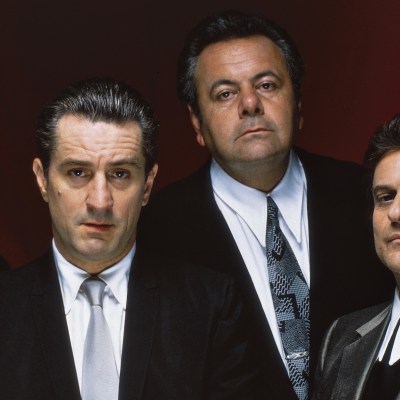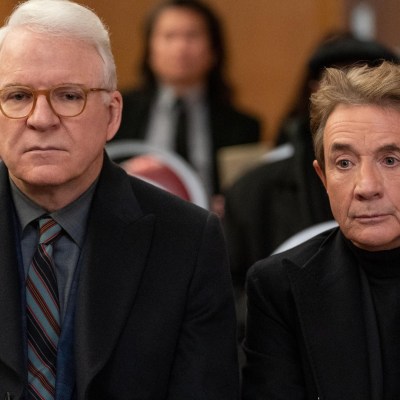The Movie That Broke Steve Martin’s Heart
Only Murders in the Building season 4 is proving to be a particularly dark one for Charles Haden-Savage, Steve Martin’s lovably tone deaf TV star of yesteryear. Of course things have always been somewhat grim for the character. In the first season, his girlfriend tried to kill him, and in the third his big Broadway break went up in smoke. Still, Martin usually plays Charles’ missteps as a source of comedy. But when the first episode this year ended on an unshakably tragic note, with Charles holding the ashes of his best friend of 30-odd years, it hit differently this time. You saw Martin’s hurt. You felt his desolation.
It’s an element of Martin’s persona which is often overlooked by fans and critics alike, but it has been there since the beginning of his film career—or at least since his second movie. While mostly remembered these days, if at all, as a pop culture curio in which audiences could see Steve Martin do some impressive tap dance numbers, Pennies from Heaven (1981) was only Martin’s sophomore effort as a leading man after successfully transitioning from stand-up comedy to the big screen. Released in the same year that Martin decided to step away from stand-up for good—a vow he mostly kept—Pennies from Heaven was intended as a turning point for the actor. And it was, although not in the way he necessarily planned for.
While receiving mostly positive notices from critics at the time, Pennies from Heaven was rejected at the box office where the movie grossed $9 million in the U.S., less than half its $22 million budget. Like so many contemporary musicals of its era, Pennies failed to find an audience. But for Martin what hurt more was that his artistic attempts to veer toward something so ambitious, so bold, and frankly so bleak was also dismissed.
In the aftermath, Martin would pivot to the type of movies he is now most famous for: feel-good comedies that mostly play to all audiences. Nonetheless, when you squint, many of his characters still have that bleeding heart which made Pennies from Heaven sing before breaking into a million pieces.
‘A Great Concept’
Based on Dennis Potter’s 1978 BBC miniseries of the same name, Pennies from Heaven paints a wistful portrait of Dust Bowl era America, even as it gives the grimness a happy coat of Hollywood paint and gloss. Set in 1934 Chicago, the Great Depression is in full swing when we meet Arthur Parker (Martin), a sheet-music salesman who already feels like time’s passed him by.
Going door to door to sell music notes to families more likely to buy a record or listen to the radio, Arthur is visibly pigeonholed by everyone as a dreamer, including his long suffering wife Joan (Suspiria’s Jessica Harper). Yet how little they realize that Arthur truly lives a life fluttering between fantasy and reality, artifice and despair. Because in his mind, Arthur is leading one glorious MGM technicolor musical. Being denied a bank loan in-person transforms in his mind into an elaborate tap dancing number. Meanwhile an illicit rendezvous with the teacher he is in love with, Eileen (Bernadette Peters), morphs into the pair really living a Fred Astaire and Ginger Rogers musical moment on the silver screen, complete with black and white photography, art deco sets, and Irving Berlin music.
But while the film is ostensibly a musical, none of the characters actually sing: rather they lip-synch to old recordings of Astaire and Rogers, or Bing Crosby and the Boswell Sisters.
The movie wants to live on both sides of the cloud line, with the opening credits highlighting Martin’s name in old-timey lettering during a beautiful sunset, and then descending after the title card beneath gloomy weather, revealing an oppressive storm front has set in before the story can even start. So while Arthur might believe there is nothing sinister about his affair with the sweet school teacher in another town, he is deluding himself since she also becomes pregnant and then homeless. Back then, an unmarried woman is shunned from places of respectability and society—the very places Arthur dreams of conquering.
It obviously must end poorly for Arthur, who finally sings with his own voice (read: Martin’s) as he reprises the titular “Pennies from Heaven” while standing on a gallows where he is about to be hanged for a murder he didn’t commit. It’s an odd mixture of light and dark which in 1981 Martin beamed to the press was “my first MGM musical” and furthermore “my first dramatic role.”
Looking back at it 40 years later in Morgan Neville’s superb STEVE! (martin): A Documentary in 2 Pieces on Apple TV+, Martin ruefully recalled, “I thought it was great. The movie has a great concept, lip-synching old songs. I loved it, and I thought it was a huge hit… and it flopped.”
Pennies from Heaven’s Place in Martin’s Career
The movie Martin made immediately before Pennies from Heaven was The Jerk, a film which also co-starred Bernadette Peters and proved that the biggest stand-up comedian of the 1970s could also be a multiplex favorite. After more than a decade of conquering comedy clubs, arenas, and late night TV, Martin was able to confirm audiences would show up at a theater for him to play, quite literally, the jerk.
It made a lot of money, but in many ways carried over from his “wild and crazy guy” image on Saturday Night Live. It didn’t necessarily showcase a lot of Martin’s own artistic sensibilities, and in the aforementioned Apple documentary, he even admitted to a revealing anecdote he’s carried with him all these years: After the film’s premiere, his father’s only appraisal of his son’s performance was “he’s no Charlie Chaplin.” Documentarian Neville shrewdly cuts from that memory to home movies of Martin’s intense six-month tap dancing classes for Pennies from Heaven.
There is a certain bittersweetness and aloofness that informs many of Martin’s best roles, such as his sadness about not being home for Thanksgiving in Planes, Trains and Automobiles (1987), or his loneliness as a modern day Cyrano de Bergerac in Roxanne (1987). Notably, however, these elements are always background texture for characters in often silly and ultimately heartwarming comedies that played it down the middle.
They are a reaction, in part, to Martin’s attempt to do “a dramatic” role being rejected. Even at the height of his career, he would look back at Pennies from Heaven‘s failure as something he felt “ashamed” about.
In the STEVE! (martin) doc, he even relays a story where shortly after the movie’s failure he found himself going to London alone and catching a late night screening of Flashdance by himself.
“So I’m sitting there just depressed and lonely, and the movie comes on,” Martin recounted, “and there’s some little scene where a kid, they’re all feeling their oats, and he says, ‘I want to be like Steve Martin.’ I recognized the irony, just sitting there, ‘You don’t want to be me fella.’”
Pennies from Heaven is a hard movie to like even if it’s extremely easy to respect. The gloominess of its disposition is so overwhelming that it drowns out the film’s various flights of fancy. But those flights do fly, from Vernel Bagneris’ lovely dance among a rainfall of literal shimmering pennies (even as Bagneris’ vagrant later proves to be the murderer Arthur takes the fall for) to a stand out cameo by Christopher Walken as a slicked-back mob land hoofer.
There is also Martin’s tender, and sincerely sweet performance as a solitary guy who cannot save himself (an impressive feat given how selfish he’s actually written to be in the script).
Martin never really let go of that character either—you can see it whenever he moved away from the Hollywood comedies that defined his success. That same melancholy appears time and again in the work he personally penned. It’s there in the one-act play WASP, which depicts a less than ideal portrait of a father and son living in 1950s Americana reminiscent of the childhood Martin experienced; it’s in Shopgirl, his 2000 novella about a lonely luxury item sales clerk who ends up in a doomed romance with an older rich man (a role he played in the movie adaptation opposite Claire Danes); and it’s in Bright Star, an underrated Broadway musical he co-wrote Edie Brickell that combined Martin’s great love of banjo and bluegrass music with Appalachian melodrama (it’s also another story about unwed mothers making tough choices in mid-20th century America).
… And it’s in Only Murders in the Building too, the popular Hulu series Martin co-created with John Hoffman about three lonely, isolated New Yorkers who find joy in obsessing every winter over the deaths and disappointments of their neighbors. It’s funny, but it’s never entirely fun for the characters. For Martin the artist, though, it might just be the pot at the end of the rainbow.
The post The Movie That Broke Steve Martin’s Heart appeared first on Den of Geek.
From https://www.denofgeek.com/movies/the-movie-that-broke-steve-martin-heart/



